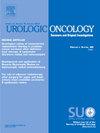Prevalence of unnecessary kidney function exclusion criteria in urologic oncology clinical trials
IF 2.4
3区 医学
Q3 ONCOLOGY
Urologic Oncology-seminars and Original Investigations
Pub Date : 2024-10-11
DOI:10.1016/j.urolonc.2024.08.017
引用次数: 0
Abstract
Introduction
Clinical trials play a pivotal role in advancing treatments for people with cancer, but often struggle with low enrollment. Unnecessarily including kidney function eligibility criteria when a trial's interventions do not have any potential kidney effects may contribute to this problem by needlessly limiting the pool of eligible patients, adding complexity to the patient screening process, and raising issues of inequitable access to trials. For these reasons, we applied custom natural language processing to assess renal function eligibility criteria, and the appropriateness of these exclusions, within phase 3 urologic oncology trials.
Methods
We accessed all phase 3 urologic oncology trials registered on ClinicalTrials.gov from 2007 to 2021. We used a custom natural language processing script to extract kidney function requirements (e.g., creatinine, GFR) from trial free-text records. For each trial, we manually coded whether any trial intervention affected renal function or was renally excreted. Additionally, we recorded the formula used to calculate GFR in each trial.
Results
Of 850 trials, 299 (35%) listed kidney function eligibility restrictions, and 432 (51%) tested an intervention with possible renal effects. Of the 299 trials with kidney function exclusions, 124 (41%) tested interventions with no kidney effects.
Conclusion
There is a major disconnect in urologic oncology clinical trials between renal function exclusions and potential harm to the kidneys from the tested interventions. Standardizing eligibility criteria and restricting enrollment based on renal function only when necessary has the potential to increase the success, access, and applicability of clinical trials.
泌尿肿瘤临床试验中不必要的肾功能排除标准的普遍性。
导言:临床试验在推动癌症患者的治疗过程中发挥着关键作用,但却经常面临入组人数少的问题。如果一项试验的干预措施对肾脏没有任何潜在影响,却不必要地加入肾功能资格标准,可能会不必要地限制符合条件的患者人数,增加患者筛选过程的复杂性,并引发试验机会不公平的问题,从而加剧这一问题。基于这些原因,我们应用定制的自然语言处理技术来评估肾功能资格标准,以及这些排除在 3 期泌尿肿瘤学试验中的适当性:我们访问了 2007 年至 2021 年在 ClinicalTrials.gov 上注册的所有 3 期泌尿肿瘤学试验。我们使用定制的自然语言处理脚本从试验的自由文本记录中提取肾功能要求(如肌酐、GFR)。对于每项试验,我们手动编码试验干预是否影响肾功能或是否经肾排泄。此外,我们还记录了每项试验中用于计算 GFR 的公式:在 850 项试验中,299 项(35%)列出了肾功能资格限制,432 项(51%)测试了可能对肾脏有影响的干预措施。在不包括肾功能的 299 项试验中,有 124 项(41%)试验的干预措施对肾脏没有影响:结论:在泌尿肿瘤临床试验中,肾功能排除与所测试的干预措施对肾脏的潜在危害之间存在严重脱节。规范资格标准并在必要时根据肾功能限制入组,有可能提高临床试验的成功率、可及性和适用性。
本文章由计算机程序翻译,如有差异,请以英文原文为准。
求助全文
约1分钟内获得全文
求助全文
来源期刊
CiteScore
4.80
自引率
3.70%
发文量
297
审稿时长
7.6 weeks
期刊介绍:
Urologic Oncology: Seminars and Original Investigations is the official journal of the Society of Urologic Oncology. The journal publishes practical, timely, and relevant clinical and basic science research articles which address any aspect of urologic oncology. Each issue comprises original research, news and topics, survey articles providing short commentaries on other important articles in the urologic oncology literature, and reviews including an in-depth Seminar examining a specific clinical dilemma. The journal periodically publishes supplement issues devoted to areas of current interest to the urologic oncology community. Articles published are of interest to researchers and the clinicians involved in the practice of urologic oncology including urologists, oncologists, and radiologists.

 求助内容:
求助内容: 应助结果提醒方式:
应助结果提醒方式:


